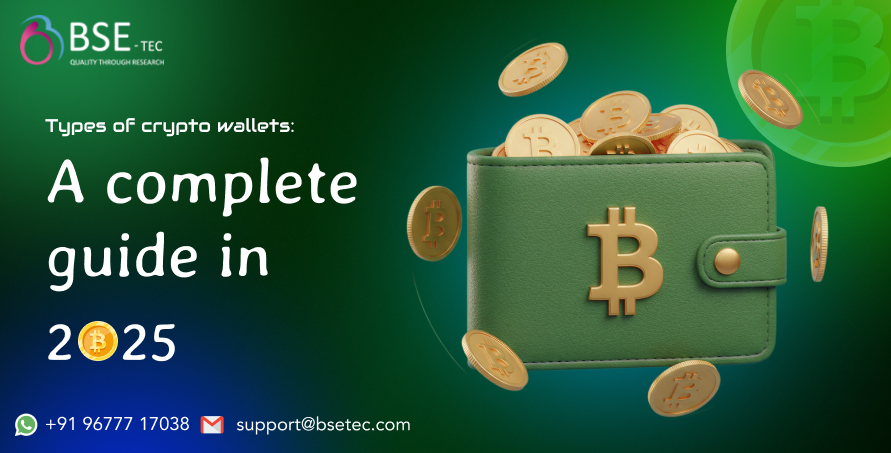
To be honest, when you first hear the term “crypto wallet,” it seems like another software on your phone. But it’s far more than that. Your wallet is what establishes your ownership in the cryptocurrency world. Without it, your digital assets are virtually inaccessible.
This blog examines the main types of wallets-particularly in today’s fast-paced digital environment.
Before we get into the different types, it’s vital to define what a crypto wallet is. A cryptocurrency wallet is a tool that allows you to store, send, and receive digital currencies such as Bitcoin, Ethereum, and other tokens. But here’s the interesting part: your cryptocurrency isn’t actually “inside” the wallet. It exists on the blockchain, and your wallet only stores the private keys that authenticate those assets belonging to you. Consider it like having a bank account, but without the bank. You are the one in control. When you transmit cryptocurrency, your wallet signs the transaction with your private key, which allows the blockchain to recognise it as authentic.
Wallets will have evolved into much more than just key storage by 2025. Many now include staking, swapping, NFT management, and DeFi access, transforming them into formidable all-in-one tools for managing your digital portfolio.
How does a crypto wallet work?
A cryptocurrency wallet serves as a conduit between the blockchain and you. A crypto wallet does not really store your cryptocurrency, in contrast to a standard wallet that contains your cash. Rather, it holds your private keys, which function similarly to digital passwords and serve as proof that you are the owner of specific blockchain coins. Every transaction is permanently recorded on the blockchain, which is a public network. All your wallet does is provide you with the means to safely engage with it.
For instance, let’s say you wish to send your friend 0.2 Bitcoin, and you have 1 Bitcoin in your wallet. You launch your wallet app, input the address of your friend’s wallet, and verify the amount. The wallet then generates a digital signature using your private key, which serves as evidence that you gave your consent to the transaction. Other computers, referred to as nodes or miners, validate the signed data and update the record on the blockchain. Your balance rises to 0.8 Bitcoin after the transaction is verified, and your friend’s wallet gains 0.2 Bitcoin.
The importance of cryptocurrency wallets in the blockchain ecosystem
Because they provide a safe and decentralized method of managing digital assets, cryptocurrency wallets are essential to the blockchain ecosystem. Using a cryptocurrency wallet, you can send, receive, and track your digital cash thanks to the blockchain’s decentralized record. They eliminate the need for intermediaries like banks by giving users full control over their money. A crypto wallet is crucial for managing the ever-changing world of cryptocurrencies and decentralized technology, whether you’re a casual user, trader, or institutional investor. As blockchain technology gains acceptance, crypto wallets will continue to be an essential tool for facilitating safe, open, and decentralized transactions worldwide.
We now focus on exploring the different types of cryptocurrency wallets.
Hot wallet
Hot wallets are digital wallets that are quick and easy to use on a daily basis since they remain linked to the internet. For traders or anyone who deals with cryptocurrency regularly, they are ideal. Your private keys are kept online when you use a hot wallet, either on the servers of the service provider or on your device. Instant transactions are made possible by this, but it also makes them more susceptible to phishing and hacker attempts.
Example: Coinbase Wallet, Trust Wallet, and MetaMask are a few of the well-known hot wallets. With the help of these apps, you can quickly purchase, sell, and trade cryptocurrency right from your phone.
Cold wallet
Cold wallets are offline storage methods that are significantly safer from hackers because they aren’t online. Your private keys are kept offline at all times. In order to sign a transaction, you must first temporarily link your cold wallet to a device and then unplug it. They are therefore perfect for long-term, substantial cryptocurrency holdings.
Example: well-known cold wallets include Trezor, SafePal, and Ledger Nano X. These are frequently used by investors to hold cryptocurrency they don’t intend to trade frequently.
Custodial wallet
A custodial wallet is one in which your private keys are held by a third-party service provider, such as an exchange or business, on your behalf. All you have to do is sign in to your exchange account, and the platform will take care of your keys and wallet. The drawback is that you’re entrusting someone else with your money, even though it’s easy to use and ideal for novices. The exchange may be compromised, putting your assets at risk.
Examples: custodial wallets that allow users to avoid direct handling of private keys are Binance, Coinbase Exchange, and Kraken.
Non-custodial wallet
What it is: You have complete ownership and control over your cryptocurrency using non-custodial wallets. Your private keys are only accessible by you; no one else can access them. You make a wallet, backup your recovery key, which is a phrase of 12 to 24 words, and handle everything on your own. It provides complete responsibility along with true decentralisation; your crypto cannot be recovered if you misplace your keys.
Examples: well-known non-custodial wallets are Exodus, MetaMask, and Trust Wallet.
Paper wallet
Your public and private keys are literally stored on a printed sheet of paper in a paper wallet, which occasionally has QR codes for convenient scanning. It is among the oldest and safest offline storage techniques. A wallet address and private key are created offline, printed, and kept in a secure location, such as a safe deposit box. Because it’s offline, it can’t be hacked online, but you still need to guard against physical harm or loss.
Hardware wallet
Hardware wallets are actual electronic gadgets made especially for safely storing cryptocurrency offline. They blend ease and safety. You can securely sign transactions without disclosing your private keys when you connect the device to your computer or phone. Your cryptocurrency remains secure within the hardware wallet even if your computer is infected with viruses.
Example: the Trezor Model T, SafePal S1, and Ledger Nano S/X are the most reputable brands.
Web wallet
An online wallet that can be accessed using a web browser is called a web wallet. No downloads or installs are required, making it simple to use. You register or log in via a website, and your keys may be kept by the service or by you, depending on the provider. Despite their convenience, web wallets rely significantly on the security of the website.
Examples: popular web wallets are Binance Web Wallet, MetaMask Web Extension, and Blockchain.com Wallet.
Desktop wallet
A desktop wallet is a piece of software that is installed straight onto your PC. You have complete control over your money and keys. Your device stores your private keys locally. Your wallet is safe as long as your PC is safe. For customers who would rather handle cryptocurrency from a computer rather than a phone or website, it’s fantastic.
Example: Exodus, Electrum, and Atomic Wallet are well-known desktop wallets.
Mobile wallet
An installed cryptocurrency wallet app on your smartphone is known as a mobile wallet. It makes it simple to transmit, receive, and store cryptocurrency at any time or anywhere. Your phone safely stores your private keys. To transact or connect to DApps, you can scan QR codes. Despite its convenience, it is regarded as a hot wallet; hence, it is crucial to use robust security (biometrics or PIN).
Example: Exodus Mobile, MetaMask Mobile, Coinomi, and Trust Wallet.
Select a wallet type according to how you trade, store, and safeguard your cryptocurrency. Each wallet type strikes a distinct balance between security and ease.
In conclusion
A cryptocurrency wallet is essential to your interactions with the world of online finance. The correct wallet guarantees convenience and security, whether you’re trading, investing, or just keeping your assets. Hot or mobile wallets are excellent options if you value speed and convenience. Cold or hardware wallets provide the best security for long-term investors who value security. Additionally, non-custodial wallets allow you to have total control over your money without depending on outside parties.
By 2025, cryptocurrency wallets will have significantly improved, enabling users to exchange assets, manage NFTs, access DeFi, and stake tokens all on the same platform. Selecting a wallet that suits your way of life and how you manage your cryptocurrency is crucial.
BSEtec can assist you if you want to build a feature-rich and safe cryptocurrency wallet. With a track record of success in Web3 solutions and blockchain technology, BSEtec creates wallets that are scalable, secure, and practical.
Get in touch with BSEtec right now to create a cutting-edge cryptocurrency wallet that enhances your online visibility and empowers your users.
Learn about the main types of crypto wallets and how they keep your digital assets safe. Find the right wallet for your crypto journey and build a secure one with BSEtec.


